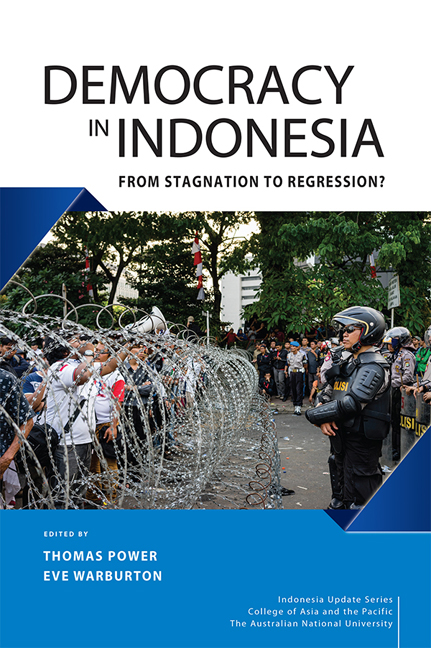Book contents
- Frontmatter
- Contents
- Tables and Figures
- Contributors
- Foreword
- Acknowledgments
- Glossary
- 1 The decline of Indonesian Democracy
- Part 1 Historic al and Comparative Perspectives
- Part 2 Polarisation and Populism
- Part 3 Popular Supp ort for Democracy
- Part 4 Democratic Institutions
- Part 5 Law, Security and Disorder
- Index
- Indonesia Update Series
8 - Electoral losers, democratic support and authoritarian nostalgia
Published online by Cambridge University Press: 24 November 2020
- Frontmatter
- Contents
- Tables and Figures
- Contributors
- Foreword
- Acknowledgments
- Glossary
- 1 The decline of Indonesian Democracy
- Part 1 Historic al and Comparative Perspectives
- Part 2 Polarisation and Populism
- Part 3 Popular Supp ort for Democracy
- Part 4 Democratic Institutions
- Part 5 Law, Security and Disorder
- Index
- Indonesia Update Series
Summary
The Joko Widodo (Jokowi) regime has conducted fraudulent elections, which damage the image of Indonesia in the eyes of the world. Democracy is already dead in Indonesia.
This is the caption that accompanies the video released by Prabowo Subianto's camp after all exit polls by reputable pollsters forecast Prabowo's defeat in the 2019 presidential election. The video went viral on social media platforms and WhatsApp group chats under the title ‘Al Jazeera TV broadcast election fraud in Indonesia’. Al Jazeera immediately issued a letter of clarification regarding the viral video, arguing that it had been edited and assigned a caption that was taken out of context and given emphasis not in the original (Ishaq 2019). Although their allegations of electoral fraud were disputed, many of Prabowo's supporters firmly believed they had been cheated, triggering massive protests outside the headquarters of the Elections Supervisory Agency (Badan Pengawas Pemilu, Bawaslu) shortly after the General Elections Commission (Komisi Pemilihan Umum, KPU) announced the result of the presidential election. The demonstrations quickly turned violent, leading to the deaths of ten protestors, and hundreds more were injured in Jakarta's worst riots since the 1998 unrest that toppled long-time dictator Suharto (Jakarta Post 2019).
Democratic stability is determined not only by the conduct of electoral winners, but also by the responses of electoral losers. When election losers become disillusioned with democracy, and then fail to subscribe to democracy as the only game in town, this can ultimately lead to democratic deconsolidation (Rich and Treece 2018). The problem gets worse if they also incite ‘violence, encourage a coup, or support the revival of the former regime’ (Grewal and Monroe 2019: 497). In this chapter, I bring the Indonesian case into conversation with a rich comparative literature on the relationship between electoral outcomes and democratic support. While Indonesia regularly holds multi-level elections, spanning local and national legislatures and direct presidential elections, surprisingly little work has been done to investigate how electoral losers react to defeat, and whether they remain committed to democracy after having cast a vote for the losing side. Studies of electoral losers typically measure support for the political system using surveys, in which respondents are asked whether they are satisfied with the way democracy works.
- Type
- Chapter
- Information
- Democracy in IndonesiaFrom Stagnation to Regression?, pp. 141 - 165Publisher: ISEAS–Yusof Ishak InstitutePrint publication year: 2020

